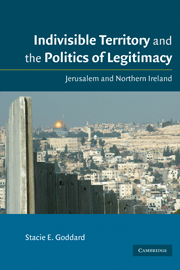2 - Constructing Indivisibility: A Legitimation Theory of Indivisible Territory
Published online by Cambridge University Press: 26 January 2010
Summary
INTRODUCTION
In the last chapter I argued that although rational choice and constructivist theories provide important insights into territorial disputes, neither sufficiently explains how territory becomes an indivisible issue. Rational choice theories assume away the problem of indivisibility, reducing it to mechanisms within the bargaining process. In doing so, they fail to acknowledge that indivisibility can be a social, if not objective, reality. At the same time, constructivist theories are overly determinative, reducing indivisibility to ethnic and religious attachments to territory. Yet because identity can be used for political and strategic reasons, it cannot in and of itself determine the divisibility of territory.
I propose indivisibility is constructed through the legitimation process. Whether territory appears indivisible depends on how actors legitimate their claims to territory during negotiations. Although actors choose their rhetoric strategically, in order to gain a political advantage at the bargaining table, legitimation strategies have unintended structural consequences. By resonating with some actors and not others, legitimation strategies either build ties between coalitions and allow each side to recognize the legitimacy of each other's claims, or lock actors into bargaining positions where they are unable to recognize the legitimacy of their opponent's demands. When the latter happens, actors come to negotiations with incompatible claims, constructing the territory as indivisible.
The argument here intersects with a growing theoretical literature that emphasizes the importance of rhetoric and legitimacy in international politics.
- Type
- Chapter
- Information
- Indivisible Territory and the Politics of LegitimacyJerusalem and Northern Ireland, pp. 18 - 46Publisher: Cambridge University PressPrint publication year: 2009

